直接英语与间接引语
(完整版)英语语法----直接引语和间接引语
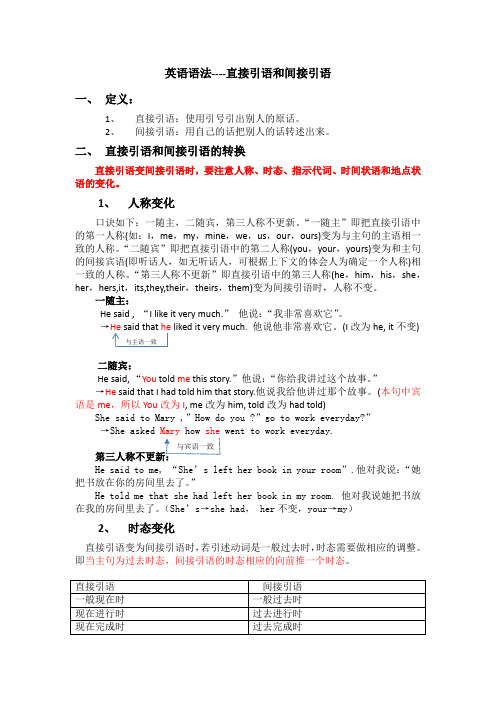
英语语法----直接引语和间接引语一、 定义:1、 直接引语:使用引号引出别人的原话。
2、间接引语:用自己的话把别人的话转述出来。
二、 直接引语和间接引语的转换直接引语变间接引语时,要注意人称、时态、指示代词、时间状语和地点状语的变化。
1、 人称变化口诀如下:一随主,二随宾,第三人称不更新。
“一随主”即把直接引语中的第一人称(如:I ,me ,my ,mine ,we ,us ,our ,ours)变为与主句的主语相一致的人称。
“二随宾”即把直接引语中的第二人称(you ,your ,yours)变为和主句的间接宾语(即听话人,如无听话人,可根据上下文的体会人为确定一个人称)相一致的人称。
“第三人称不更新”即直接引语中的第三人称(he ,him ,his ,she ,her ,hers,it ,its,they,their ,theirs ,them)变为间接引语时,人称不变。
一随主:He said , “I like it very much.” 他说:“我非常喜欢它”。
→liked it very much. 他说他非常喜欢它。
(I 改为he, it 不变)二随宾:He said, “You told me this story.”他说:“你给我讲过这个故事。
”→He said that I had told him that story.他说我给他讲过那个故事。
(本句中宾语是me ,所以You 改为I , me 改为him, told 改为had told)She said to Mary ,”How do you ?”go to work everyday?” →She asked Mary how she went to work everyday. 第三人称不更新:He said to me, “She’s left her book in your room ”.他对我说:“她把书放在你的房间里去了。
(完整)高中英语直接引语和间接引语讲解
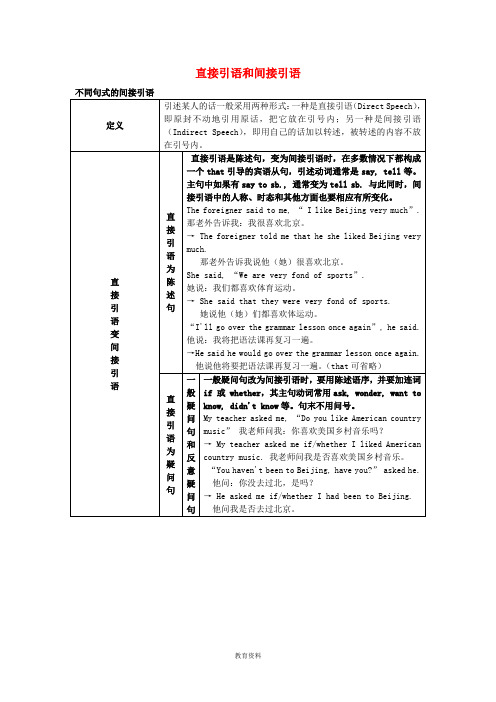
“What about having a drink?”he asked.
他问:喝杯怎么样?
He suggested having a drink. 他建议喝一杯。
②.advise sb to do
“Why don't you go hiking”, asked James.
他说:你看起来气色多好啊!
→ He said how well I looked.
他说我看起来是气色多好啊。
2.有些感叹句可以根据原句的意思,采用适当的动词变为陈述句,不需用间接宾语来转述。
“Help!”, he cried. 他喊到:救命啊!
→ He called for help. 他大声呼救。
“What a clever boy you are!”, my teacher said to him.
老师对他说,你是个聪明的孩子啊!
→ My teacher told him what a clever boy he was.
老师对他说他是一个多聪明的孩子啊。
He said,“How well you look!”.
直接引语和间接引语
不同句式的间接引语
定义
引述某人的话一般采用两种形式:一种是直接引语(Direct Speech),即原封不动地引用原话,把它放在引号内;另一种是间接引语(Indirect Speech),即用自己的话加以转述,被转述的内容不放在引号内。
直
接
引
语
变
间
接
引
语
直接引语为陈述句
直接引语是陈述句,变为间接引语时,在多数情况下都构成一个that引导的宾语从句,引述动词通常是say, tell等。主句中如果有say to sb., 通常变为tell sb. 与此同时,间接引语中的人称、时态和其他方面也要相应有所变化。
什么是直接引语和间接引语

什么是直接引语和间接引语?直接引语(Direct Speech)和间接引语(Indirect Speech)是英语中用来引述他人的话语的两种方式。
它们有不同的语法结构和用法。
下面是关于直接引语和间接引语的详细解释和使用指导:1. 直接引语:直接引语是将别人的话语直接引用,使用引号将其括起来。
直接引语保留了原始说话者的原话,包括时态、人称和语气。
例如,直接引语可以是:"I love watching movies," she said ("我喜欢看电影,"她说)。
2. 间接引语:间接引语是将别人的话语转述成自己的话,不使用引号。
间接引语通常以动词引导,如say、tell、ask等,并引入一个从句来表示所引述的内容。
间接引语通常改变了时态、人称和语气。
例如,间接引语可以是:She said that she loved watching movies(她说她喜欢看电影)。
3. 直接引语和间接引语的转换:在将直接引语转换为间接引语时,需要注意以下几个方面:-时态的变化:一般情况下,时态会发生变化,根据具体情况进行调整。
例如,一般现在时变为一般过去时,现在进行时变为过去进行时等。
-人称的变化:人称也会发生变化,根据具体情况进行调整。
例如,第一人称变为第三人称,第二人称根据情况变为第三人称或保持不变。
-代词的变化:代词也需要根据情况进行变化。
例如,第一人称的代词"I"变为第三人称的代词"he/she",第二人称的代词"you"根据情况变为第三人称的代词或保持不变。
-时间和地点的变化:时间和地点也可能发生变化,根据具体情况进行调整。
4. 引导词的变化:在间接引语中,引导词通常用来引导从句,并在引语中提供信息。
例如,"She said, 'I love watching movies'"("她说,'我喜欢看电影'")可以转换为"She said that she loved watching movies"(她说她喜欢看电影)。
英语直接引语和间接引语
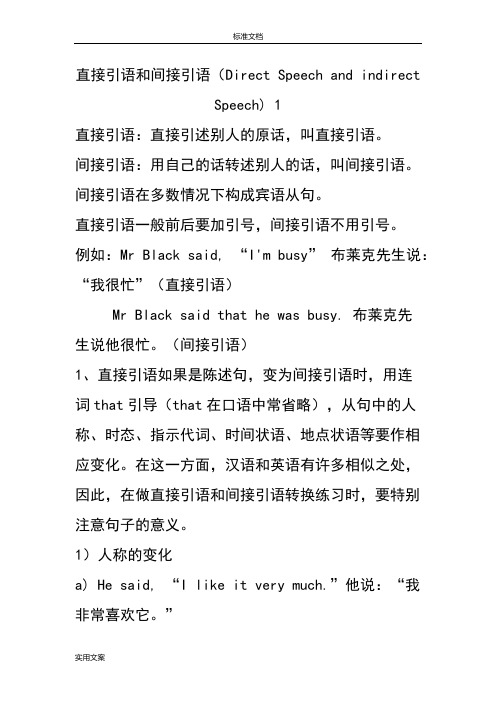
直接引语和间接引语(Direct Speech and indirectSpeech) 1直接引语:直接引述别人的原话,叫直接引语。
间接引语:用自己的话转述别人的话,叫间接引语。
间接引语在多数情况下构成宾语从句。
直接引语一般前后要加引号,间接引语不用引号。
例如:Mr Black said, “I'm busy”布莱克先生说:“我很忙”(直接引语)Mr Black said that he was busy. 布莱克先生说他很忙。
(间接引语)1、直接引语如果是陈述句,变为间接引语时,用连词that引导(that在口语中常省略),从句中的人称、时态、指示代词、时间状语、地点状语等要作相应变化。
在这一方面,汉语和英语有许多相似之处,因此,在做直接引语和间接引语转换练习时,要特别注意句子的意义。
1)人称的变化a) He said, “I like it very much.”他说:“我非常喜欢它。
”He said that he liked it very much.他说他非常喜欢它。
b) He saidto me, “I've left my book in your room.”他对我说:“我把书放在你的房间里了。
” He told me that he had left his book in my room.他告诉我他把书放在我的房间里了。
2)时态的变化如主句的谓语动词是一般过去时,直接引语变间接引语时,从句的谓语动词在时态方面要作相应的变化。
如主句的谓语动词是现在时,从句的时态则无需变化。
时态的变化例句直接引语间接引语一般现在时→一般过去时He said, “I'm afraid I can't finish this work.”He said that he was afraid he couldn't finish that work.现在进行时→过去进行时He said, “I'm using theknife.”He said that he was using the knife.现在完成时→过去完成时She said, “I have not heard from him since May.”She said that she had not heard from him since May.一般过去时→过去完成He said, “I came to help you.”He said that he had come to help me.过去完成时不变He said, “I had finished my homework before supper.”He said that he had finished his homework before supper.3)指示代词、时间状语、地点状语和动词的变化:变化例句直接引语间接引语this-that这个-那个She said, “Iwill come this morning."She said that she would go that morning. these-those这些=那些He said, "These books are mine."He said that those books were his.now-then现在-那时He said, "It is nine 0'clock now."He said that it was nine 0'clock then. today-that day今天-那天He said, "I haven't seen her today."He said that he hadn't seen her that day. yesterday-the day before昨天-前一天she said, "I went there yesterday."She said that she had gone there the day before.tomorrow-the next(following) day明天-第二天she said, "I'll go there tomorrow."She said that she would go there the next (following) day.here-there这里-那里come-go来-去注:(1)直接引语如果是客观真理,变为间接引语时,时态不变。
英语语法 直接引语与间接引语
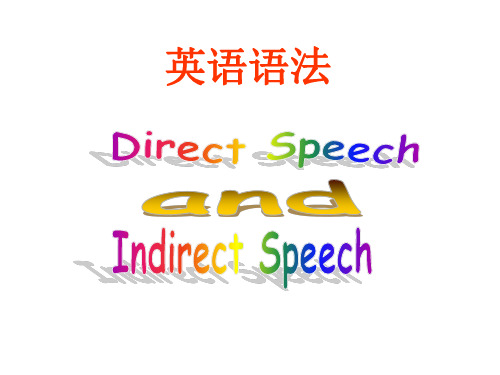
特殊疑问句 直接引语变间接引语的结构:
A asked +原句疑问词 She asked when they built that bridge. A asked B +原句疑问词 Mrs. Bill asked him which book he liked best.
祈使句:
改为间接引语后,就成了以不定式短语 形式出现的宾语补足语(动词常是ask/ tell/order/advise/warn /remind等)。 He said to the girl, “Do it at once.” He told the girl to do it at once. Mrs. Hill said, “ please sing at our party, Mary.” Mrs. Hill asked Mary to sing at their party.
英语语法
一字不改地引用或复述别人的 话,被引用或复述的部分就叫直接引语; 直接引语必须都放在引号中,其位置 常在句尾或句首。
用自己的话转述别人的话;被转述的部分 就叫间接引语;间接引语不必用括号,一 般用宾语从句或复合宾语表达法。
原封不动引用别人的原话,原话在引号中。 “Take off your boots,” he said. “I don‟t know where your bike is,” said the Arab.
一般疑问句 直接引语变间接引语的结构:
A asked if/whether He asked if/whether I could hear him. A asked B if whether The teacher asked Bob if/whether he had read that book.
英语语法 直接引语和间接引语

直接引语和间接引语引用别人的话一般有两种方式,一种是直接引用别人的原话,并把它放在引号内,这叫 直接引语;另一种是用自己的话来转述别人的话,并且不能用引号,这就是间接引语。
间接 引语在许多情况下构成宾语从句。
“I want to buy a house in the country.” Jack said. 杰克说:“我想在乡下买座房子。
”(直接引语) Jack said that he wanted to buy a house in the country. 杰克他说他想在乡下买座房子。
(间接引语) 1. 直接引语变间接引语的七大变化 (1) 人称变化 下面有一句顺口溜“一随主,二随宾,第三人称不更新”。
① 一随主 是指在直接引语变间接引语时, 如果从句中的主语是第一人称或被第一人称所修饰。
从 句中的人称要按照主句中主语的人称变化。
She said. “My brother wants to go with me.” → She said her brother wanted to go with her. ② 二随宾 是指直接引语变间接引语时, 若从句中的主语及宾语是第二人称。
或被第二人称所修饰。
从句中的人称要跟引号外的主句的宾语一致。
如果引号外的主句没有宾语。
也可以用第一人 称。
He said to Kate. “How is your sister now?” → He asked Kate how her sister was then。
③ 第三人称不更新 是指直接引语变间接引语时,如果从句中的主语及宾语是第三人称或被第三人称所修 饰,从句中的人称一般不需要变化。
Mr. Smith said: “Jack is a good worker。
” →Mr. Smith said Jack was a good worker。
(2) 时态的变化 直接引语变为间接引语时, 若主句为过去时态, 变为间接引语的宾语从句通常要将时态 往后推一个。
初中英语语法-直接引语和间接引语

初中英语语法-直接引语和间接引语
语法要点:直接引语和间接引语属于宾语从句范畴。
直接引述别人的原话,叫直接引语;用自己的话转述别人的话,或引用自己说过的话,叫间接引语。
由于时间、地点以及人物都有可能起变化,所以间接引语中的时态、人称、语序、指示代词、时间状语、地点状语等要作相应的变化。
1. 直接引语和间接引语的转换方法
①间接引语语序改为陈述句语序
陈述句用that 引导,口语中常省略She said,例:
“I am going to the cinema. ”
→ She said (that) she was going to the cinema.
②一般疑问句
用if/whether连接,例:
“Have you ever travelled by plane?” she asked me.
→ She asked me if / whether I had travelled by plane.
③反意疑问句
用if/whether连接,例:
He asked,“You are a doctor,aren’t you?”
→ H e asked (me) if / whether I was a doctor.。
英语直接引语与间接引语

英语直接引语与间接引语直接引语和间接引语是英语中常见的引述他人说话或思想的方式。
在书写中,我们需要了解如何正确地使用和引用直接引语和间接引语。
以下是关于英语直接引语和间接引语的详细介绍。
一、直接引语直接引语是将原话使用引号直接援引出来并照原样呈现的方式。
在引用直接引语时,需要使用适当的标点符号、引号和动词。
例如:1. 她说:“我很喜欢这本书。
”2. “你什么时候回来?”他问道。
3. “我会帮助你的。
”他向我保证道。
在直接引语中,引号需要紧贴引文,句号或其他标点符号则放在引号之内。
动词通常在引语之后的逗号或冒号之前使用。
需要注意的是,当某人的原话跨越多个段落时,只需要在首次引用时使用引号,其他段落之前不再使用引号。
二、间接引语间接引语是通过转述或改写原话的方式来引述他人的说话或思想。
在间接引语中,不需要使用引号,而是通过动词的变化来呈现原话。
例如:1. 她说她很喜欢那本书。
2. 他问我什么时候回来。
3. 他向我保证会帮助我。
在使用间接引语时,需要将原话改写成陈述句,并修改人称和动词的时态,以适应引述者的身份。
对于引述他人的提问,需要将原问句改写成陈述句。
需要注意的是,间接引语中不需要使用句号或其他标点符号。
三、引用动词在使用直接引语或间接引语时,我们需要使用适当的引用动词。
以下是常见的引用动词:1. 说(said)例如:“我很喜欢这本书。
”她说道。
2. 问(asked)例如:“你什么时候回来?”他问道。
3. 回答(answered)例如:“我会帮助你的。
”他回答道。
4. 告诉(told)例如:“明天会下雨。
”他告诉我。
5. 表示(expressed)例如:“我对这个决定感到满意。
”她表示。
需要根据具体情境选择合适的引用动词,并根据时态和人称进行变化。
总结:英语直接引语和间接引语是引述他人说话或思想的两种常见方式。
在使用直接引语时,需要使用引号和适当的标点符号,并在引语之后使用适当的动词。
而在使用间接引语时,需要将原话改写成陈述句,并通过动词的变化来呈现原话。
英语语法直接引语和间接引语
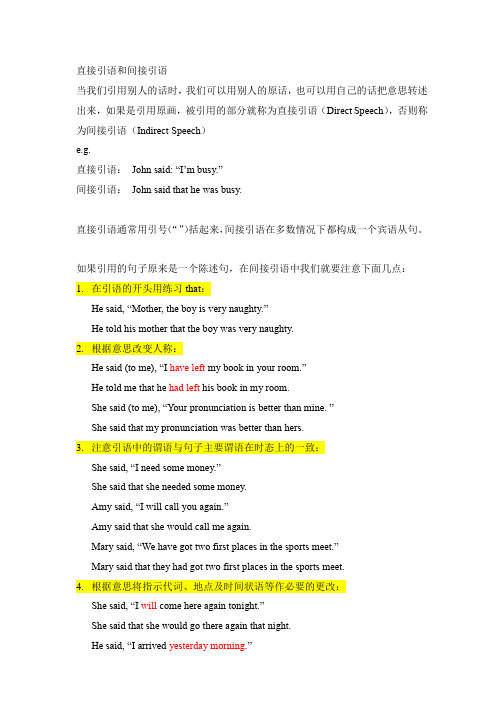
直接引语和间接引语当我们引用别人的话时,我们可以用别人的原话,也可以用自己的话把意思转述出来,如果是引用原画,被引用的部分就称为直接引语(Direct Speech),否则称为间接引语(Indirect Speech)e.g.直接引语:John said: “I’m busy.”间接引语:John said that he was busy.直接引语通常用引号(“”)括起来,间接引语在多数情况下都构成一个宾语从句。
如果引用的句子原来是一个陈述句,在间接引语中我们就要注意下面几点:1.在引语的开头用练习that:He said, “Mother, the boy is very naughty.”He told his mother that the boy was very naughty.2.根据意思改变人称:He said (to me), “I have left my book in your room.”He told me that he had left his book in my room.She said (to me), “Your pronunciation is better than mine. ”She said that my pronunciation was better than hers.3.注意引语中的谓语与句子主要谓语在时态上的一致:She said, “I need some money.”She said that she needed some money.Amy said, “I will call you again.”Amy said that she would call me again.Mary said, “We have got two first places in the sports meet.”Mary said that they had got two first places in the sports meet.4.根据意思将指示代词、地点及时间状语等作必要的更改:She said, “I will come here again tonight.”She said that she would go there again that night.He said, “I arrived yesterday morning.”He said that he had arrived the morning before.She said, “My sister will be back tomorrow evening.”She said (that) her sister would be back the following evening.一般来讲,here改为there,today改为that day等。
初中英语语法大全:直接引语和间接引语

初中英语语法大全:直接引语和间接引语语法要点:直接引语和间接引语属于宾语从句范畴。
直接引述别人的原话,叫直接引语;用自己的话转述别人的话,或引用自己说过的话,叫间接引语。
由于时间、地点以及人物都有可能起变化,所以间接引语中的时态、人称、语序、指示代词、时间状语、地点状语等要作相应的变化。
①间接引语语序改为陈述句语序陈述句用that 引导,口语中常省略She said,例:“I am going to the cinema. ”→ She said she w as going to the cinema.②一般疑问句用if/whether连接,例:“Have you ever travelled by plane?” she asked me.→ She asked me if / whether I had travelled by plane.③反意疑问句用if/whether连接,例:He asked,“You are a doctor,aren’t you?”→ He asked i f / whether I was a doctor.④特殊疑问句由原疑问词连接,例:He asked, “Who will come to help us?”→ He asked who would come to help them.She said, “Where have you been,Simon?”→ She asked Simon where he had been.⑤选择疑问句由whether…or 引导,例:Eddie said, “Is this a TV set or a computer?”→ Eddie asked whether that was a TV set or a computer.⑥祈使句用“tell /ask /order someone to do something” 结构,将动词原形变为动词不定式,例:“Put up your hands,” said the teacher.→ The teacher told them to put up their hands.“Don’t play football on the street,” the policeman said.→ The policeman ordered us not to play football on the street.如主句的谓语动词是一般过去时,直接引语变间接引语时,从句的谓语动词在时态上要作相应变化:直接引语间接引语一般现在时→ 一般过去时现在进行时→ 过去进行时现在完成时→ 过去完成时一般过去时→ 过去完成时过去完成时→ 过去完成时一般将来时→ 过去将来时①指示代词this →thatthese → those②时间状语now → thentoday → that daytonight → that nightthis morning → that morningtomorrow → the next daynext week → the next weekyesterd ay → the day beforelast week → the week beforethree days ago → three days before③地点状语here → there④动词come → go特别提示:以上变化要根据说话的实际情况来定,不要机械地照搬。
英语直接引语和间接引语

英语直接引语和间接引语1. 直接引语定义:直接引用原话,把它放在引号内,不需要改变句子结构中的时态或代词。
如下:They said, “We watched a movie last night.”他们说,“我们昨晚看了一部电影。
”2. 间接引语定义:用自己的话加以转述,被转述的内容不放在引号内。
间接引语大都是宾语从句,当直接引语为陈述句或者疑问句被转换成间接引语时,句子的结构,人称,时态,时间状语和地点状语等都要发生改变。
如下:Tom said, “I am so hungry.” (direct speech)汤姆说:“我太饿了。
”(直接引语)Tom said that he was so hungry. (indirect speech)汤姆说他太饿了。
(间接引语)在间接引语中我们可以发现人称I变成了he,动词am变成了was。
那么我们就来具体看看由直接引语变为间接引语时,我们的人称和时态如何变化:如何变人称:有一句顺口溜“一随主;二随宾;第三人称不更新”。
“一随主”是指在直接引语变间接引语时,如果从句中的主语是第一人称,从句中的人称要按照主句中主语的人称变化,如:She said, "My brother wants to go with me. "→She said her brother wanted to go with her.“二随宾”是指直接引语变间接引语时,若从句中的主语及宾语是第二人称。
从句中的人称要跟引号外的主句的宾语一致。
如:He said to Kate, "How is your sister now?"→He asked Kate how her sister was then。
“第三人称不更新”是指直接引语变间接引语时。
如果从句中的主语及宾语是第三人称,从句中的人称一般不需要变化。
如:Mr. Smith said, "Jack is a good worker。
什么是直接引语和间接引语

什么是直接引语和间接引语?直接引语(Direct Speech)和间接引语(Indirect Speech)是英语中用来引述他人的话语或思想的两种方式。
直接引语是直接将别人的话或思想用他们原本的措辞和形式引述出来。
在直接引语中,引述的话或思想放在引号内,并使用说话动词直接引用。
例如:- John said, "I am going to the store."(约翰说:“我要去商店。
”)间接引语是将别人的话或思想用自己的措辞和形式转述出来。
在间接引语中,引述的话或思想不再放在引号内,而是通过使用动词的不同形式来表示。
通常需要将引述的话或思想变成宾语从句,并根据引述的内容和上下文做相应的变化。
例如:- John said that he was going to the store.(约翰说他要去商店。
)下面是一些关于直接引语和间接引语的规则和例子:1. 动词的变化:-时态变化:直接引语中的动词时态需要根据引述的时间进行变化。
- He said, "I am reading a book."(他说:“我正在读一本书。
”)→ He said that he was reading a book.(他说他正在读一本书。
)-人称变化:直接引语中的第一人称和第二人称需要根据引述的人进行变化。
- She said, "I will come with you."(她说:“我会和你一起来。
”)→ She said that she would come with me.(她说她会和我一起来。
)2. 代词的变化:-直接引语中的人称代词需要根据引述的人进行变化。
- He said, "I love her."(他说:“我爱她。
”)→ He said that he loved her.(他说他爱她。
)3. 时态变化和标点符号:-若引述的事实仍然是真实的或者普遍适用的,间接引语中的时态可以保持不变。
语法要诀直接与间接引语的区别

语法要诀直接与间接引语的区别直接引语与间接引语是语法学中两个重要的概念,它们用于引述他人的话语或思想观点。
在日常英语交流和写作中,正确运用直接引语和间接引语能够让我们的表达更加准确、清晰。
接下来,本文将就直接引语和间接引语的区别进行论述。
一、直接引语直接引语是指将他人的原话直接用引号引述出来的句子或短语。
当我们在写作中要引用别人的具体语句时,就需要使用直接引语,并用引号将其括起来。
例如:1. 直接引语的一般形式:He said, "I am tired."直接引语是原话的直接表述,用引号将其括起来,引号内的句子保持原封不动,没有进行任何改动。
2. 直接引语的时态变化:He said, "I am teaching English."当直接引语所引述的内容发生在过去,但是引述时发生在现在,我们需要根据引述的时间点来调整直接引语中的时态。
这样可以保证引述的准确性。
二、间接引语间接引语是指用自己的语言来总结、概括别人的原话或思想观点。
在间接引语中,我们不再使用引号,而是将原话转述为宾语从句或者其他的间接引语结构。
例如:1. 间接引语的一般形式:He said that he was tired.与直接引语不同,间接引语是将原话转述为一个完整的句子,并且去掉了引号,使用了连接词“that”来引导宾语从句。
2. 间接引语的时态变化:He said that he was teaching English.当间接引语所转述的内容发生在过去,我们需要根据转述时的时间点来调整间接引语中的时态。
三、直接引语与间接引语的区别直接引语和间接引语在表达上有几个重要的区别:1. 标点符号的不同:直接引语使用引号来括起来,而间接引语没有引号。
2. 转述方式的不同:直接引语是将他人的原话直接引述出来,而间接引语是用自己的话对原话进行转述。
3. 时态和人称的调整:直接引语中的时态和人称保持原封不动,而间接引语中需要根据转述时的时间点和人称进行相应的调整。
直接引语和间接引语

英语:直接引语和间接引语一、区别:直接引语指直接引用别人说的话,有引号。
间接引语指用自己的话转述别人的话。
间接引语在多数情况下可构成宾语从句且不要加引号。
二、要点:直接引语如果是陈述句,变为间接引语时,用连词that(可省略)引导,从句中的人称、时态、指示代词、时间状语、地点状语都要发生相应的变化。
三、引导词的选择及语序1. 陈述句:S + V + that + 陈述语序(S + V)“That is the trouble”, said Bill.改为:Bill said ___________________________the trouble.注意:that 可省略,但如果是两个或两个以上的宾语从句并列,则第二个that不可省略。
He told me (that) he had finished his work and that he would like to have a holiday.2. 一般疑问句:S + V + if / whether + 陈述语序(S + V)He asked, “Are you leaving tonight?”改为:He asked us ___________________________leaving that night.3. 特殊疑问句:S + V + what / who / which / whose / when + 陈述语序(S + V)“Why did you lock the door?” father said to Anne.改为:Father asked Anne ____________________________________the door.四、时态的一致1.主句是过去时,变间接引语时,从句时态向“过去”退一步:2.直接引语是客观真理时,变成间接引语时时态不变:The teacher said, “The earth goes round the sun.”改为:The teacher _________ _________ _________ _________ noise in the library.3. 直接引语中有明确表示过去时间状语的,变成间接引语时时态不变:Wei Fang said, “I was born in 1994.”改为:Wei Fang said _________ _________ _________ born in 1994.4.直接引语前面的主句谓语是现在时态,变间接引语时,时态不变:He says, “I have been married for 3 years.”改为:He said that _________ _________ _________ _________ for 3 years.五、人称及状语的变化1.人称变化:“一主二宾三不变”(直接引语中若出现第一人称则看主句主语,第二人称看主句宾语,第三人称无须变)试观察:She said to him, “I am very hungry.”改为:She told him that she was very hungry.She said to him, “You are very nice.”改为:She told him that he was very nice.She said to him, “Lily is very nice.”改为:She told him that Lily was very nice.2.状语与限定词变化:“这这那那,来来去去”。
英语直接引语和间接引语

主 句主的人称保 Tennis.”
she liked tennis.
持一致
二 随 宾
引号内的第二人 称变间引后与主 句宾语的人称保 持一致
He said toLily, “ you must get up early.”
He told Lily that she must get up early.
The children didn't know who he was. 三如果宾语从句所表示的是客观事实普遍真理自 然现象或习惯性动作等,不管主句用什么时态, 从句时态都用一般现在时。如:
The teacher said that the earth goes round the sun.老师说地球绕着太阳转。
D. if he heard…the week ago
Sandy said to her friends that I don’t like
computers. said
she
didn’t
Sandy said to her friends that she didn’t like computers.
一.“I never eat meat.” he said.
Indirect Speech间接引语
She said she liked singing. She said she was waiting for a bus. She said she had visited Europe the year before.
直接引语是陈述句,变为间接引语时用
that引导宾语从句.用sayto me,tell,
第三 人称 不变
引号内的第三人 She said to
初中英语-直接引语和间接引语

初中英语-直接引语和间接引语本文将介绍初中英语课程中的语法知识点——直接引语和间接引语。
本文将从基本概念、语法形式、使用方法、注意事项等方面详细介绍该知识点。
一、基本概念直接引语和间接引语是英语中常见的语法现象。
它们分别指的是述语动词的宾语部分是直接引用别人的话语(直接引语)或间接引用别人的话语(间接引语)。
例如,直接引语可以是:“He is a good boy,” said Mary.在这个例子中,“He is a good boy”是Mary的话,直接引语就是这句话。
而间接引语可以是:Mary said (that) he was a good boy.在这个例子中,“he was a good boy”是Mary的原话,但是没有直接引用,而是通过间接引用的方式呈现出来。
二、语法形式1. 直接引语直接引语的语法形式为:引言词(said, told, shouted等)+引语(用引号括起来)+标点符号。
例如:“Can I have a glass of water?” asked John.“I love you,” said the little girl.2. 间接引语间接引语的语法形式为:引言词(said, told, shouted等)+that从句(即原话的内容)。
例如:John asked if he could have a glass of water.The little girl said that she loved me.需要注意的是,当引言词是ask, inquire, wonder等疑问词时,that从句可省略。
例如:John asked whether he could have a glass of water.三、使用方法1. 直接引语直接引语一般用在引言人讲话的情境下,以体现讲话人的语气和情感。
例如:“Get out of here!” yelled the teacher.“Congratulations on your graduation,” said the principal.2. 间接引语间接引语一般用在转述别人的话语,或者是将别人讲话的内容作为证据等场合。
- 1、下载文档前请自行甄别文档内容的完整性,平台不提供额外的编辑、内容补充、找答案等附加服务。
- 2、"仅部分预览"的文档,不可在线预览部分如存在完整性等问题,可反馈申请退款(可完整预览的文档不适用该条件!)。
- 3、如文档侵犯您的权益,请联系客服反馈,我们会尽快为您处理(人工客服工作时间:9:00-18:30)。
• • • • • • • • • •
4. “You don’t like English, do you?” she asked. →She asked ________. A. if we like English, do we B. whether we like English C. if we liked English D. whether we liked English or not 5. He asked me ________ with me. A. what the matter is B. what the mater was C. what’s the matter D. what was the matter 6. He said, “Don’t do that again.” He _____ me _______ that again. • A. said to me; not to do B. said to me; don’t do • C. told me; don’t do D. told me; not to do
• • • •
教材11页B答案 e interesting and attractive photos. 3.we (shoulid) use eye-catching logos. 4.we (should) make the slogans short and easy to remember. • 5.make good use of colors to attract one’s attention. • 虚拟语气 • 建议Recommend/suggest/advise+that +(should) +do
• 4.He asked me what I wanted. • 5.I said I was not sure how mum would feel when she got my present, but I had made up my mind to give her one.
•
单项选择
• • • • • •
教材92页习题答案 C1 3.Do you have 7.Will come C2 1. The teacher told us that the sun rises in the east and goes down in the west. • 2.I asked my friends if/whether they had bought presents for their mothers. • 3.The mother asked the boy not to play fire.
1.Direct speech
Reported speech
• 直接英语变间接引语四字经 • 一看句型(陈述句,疑问句,祈使句)
• 二选引导词(that,if/whether,特殊疑问词)
• 三转(时态和人称) • 四特(表建议、请求的问句和祈使句使用动词 +sb+to do sth变为间接引语)
• 1. “Have you seen the film?” he asked me. →He asked me _______. • A. had I seen the film B. have I seen the film • C. if I have seen the film D. whether I had seen the film • 2. “Please close the window,” he said to me. • →He ______ me _____ the window. • A. said to; to close B. told to; closing • C. asked ; to close D. said to; please close • 3. “I am a teacher,” Jack said. →He said _________. • A. that I am a teacher B. I was a teacher • C. that he is a teacher D. he was a teacher
• 2.espress your opinions and give reasons • 表达观点的句型: • 1.I (don’t) think/believe that…我认为 • 2.In my opinion/To me…就我看来 • 3.it seems to that…对我而言
• Discussion: It is good or bad to rain? Why? 讨论:下雨天好还是不好?为什么? • I think it is good to rain because/as/since ….. • • • • • I think rainy days are bad for several reasons. First,… Second,… Then,… Finally,…
